Note: Author Roddy Doyle is WINNER of the Bord Gais Energy Irish Book Award for The Guts (2013), WINNER of the Irish PEN Award for his contributions to Irish Literature (2009), and WINNER of the Man Booker Prize for Paddy Clarke Ha Ha Ha.
“I can never resist your smile,” [Brother Murphy] had said. He’d seen me when I’d walked in the front gate on the first day. The Brothers’ house was beside the school. All the Brothers lived in there. Murphy must have been looking out the window of his bedroom, at all the new first-years as they arrived. And he’d decided I was the one….I had no big brothers; [so] no one had warned me about him.”
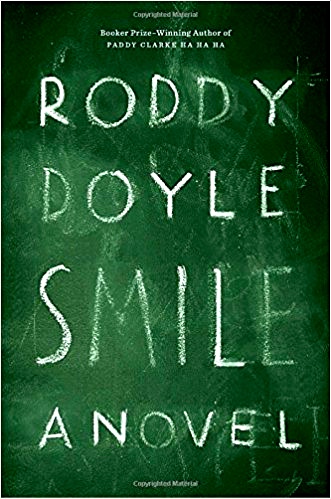 Author of eleven novels for adults, several collections of short stories, many novels for children, and numerous screenplays, including the BAFTA Award-winning screenplay for the film of The Commitments, Irish author Roddy Doyle writes what is arguably his most serious novel, the ironically titled Smile. His characteristic light touch and his humor, even during times of financial difficulties for his working-class Dublin characters, are almost totally missing from this novel, a first-person story of Victor Forde, a man who once wrote radio and newspaper stories about entertainment but gradually found himself unable to write anymore. Like his other novels, this one maintains a conversational tone, but here Victor is talking to himself most of the time, as he tries to figure out how he came to be in the circumstances in which he now finds himself – separated from his wife, living in a flat new to him, not far from where he grew up, essentially unemployed and lacking the ability to see his writing projects through to completion. Were it not for the fact that he has deliberately chosen Donnelly’s pub for his evening entertainment each night, he would have few, if any daily contacts with the outside world.
Author of eleven novels for adults, several collections of short stories, many novels for children, and numerous screenplays, including the BAFTA Award-winning screenplay for the film of The Commitments, Irish author Roddy Doyle writes what is arguably his most serious novel, the ironically titled Smile. His characteristic light touch and his humor, even during times of financial difficulties for his working-class Dublin characters, are almost totally missing from this novel, a first-person story of Victor Forde, a man who once wrote radio and newspaper stories about entertainment but gradually found himself unable to write anymore. Like his other novels, this one maintains a conversational tone, but here Victor is talking to himself most of the time, as he tries to figure out how he came to be in the circumstances in which he now finds himself – separated from his wife, living in a flat new to him, not far from where he grew up, essentially unemployed and lacking the ability to see his writing projects through to completion. Were it not for the fact that he has deliberately chosen Donnelly’s pub for his evening entertainment each night, he would have few, if any daily contacts with the outside world.
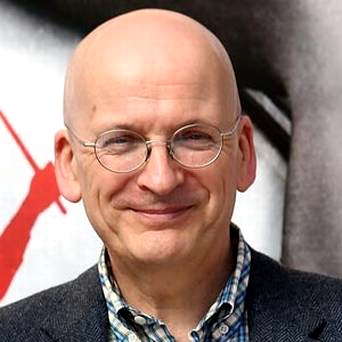 By alternating Victor’s thoughts as he deals with his current lifestyle changes in one set of chapters, and flashbacks to his childhood and earlier years in others, Doyle is able to create a broad picture of Victor’s background and how he became the man he is at present. When a stranger named Edward Fitzpatrick approaches him at the bar and claims to remember him from his childhood, Victor has no idea who he is or was, and it is only through strong hints from Fitzpatrick that he begins to think he might actually have known him. Before long, Victor is sorry that that he didn’t just walk out and keep walking, but even that would not have protected him from Fitzpatrick, who already knows where he lives. What’s more – he says he remembers him from his days at the Christian Brothers School which they both attended. Fitzpatrick’s references to Brother Murphy and his attraction to Victor and his smile upends Victor’s life, reminding him of some of the details of childhood he’d been happy to forget – along with the teasing he had to endure while dealing with his abuse.
By alternating Victor’s thoughts as he deals with his current lifestyle changes in one set of chapters, and flashbacks to his childhood and earlier years in others, Doyle is able to create a broad picture of Victor’s background and how he became the man he is at present. When a stranger named Edward Fitzpatrick approaches him at the bar and claims to remember him from his childhood, Victor has no idea who he is or was, and it is only through strong hints from Fitzpatrick that he begins to think he might actually have known him. Before long, Victor is sorry that that he didn’t just walk out and keep walking, but even that would not have protected him from Fitzpatrick, who already knows where he lives. What’s more – he says he remembers him from his days at the Christian Brothers School which they both attended. Fitzpatrick’s references to Brother Murphy and his attraction to Victor and his smile upends Victor’s life, reminding him of some of the details of childhood he’d been happy to forget – along with the teasing he had to endure while dealing with his abuse.
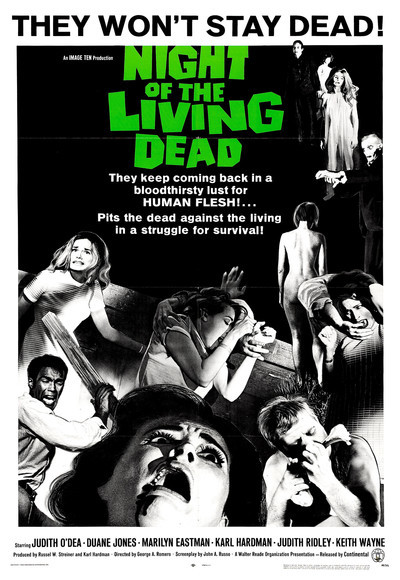
Victor becomes obsessed with werewolves, vampires and zombies, whom he believes are real, resembling the Brothers.
Slowly, Victor’s story begins to develop, and some answers to questions about his life begin to appear. It is at this point in which Doyle reveals some of his genius at characterization through effective dialogue. The reader learns that Victor was married for years to Rachel Carey, a woman with whom he fell totally in love, and who loved him with the same enthusiasm. We do not know why or how they separated, but Victor’s reminiscences are lively and realistic, so much so that I was stunned by their effectiveness. I am not a male, not Catholic, and not Irish, but I was drawn completely into Victor’s Irish working class world, and I began to feel as if I were inside his head, sharing his thoughts with him while hoping that he would reveal more information. His vulnerability and his obvious suffering from his abuse by a priest make him a person with whom many readers will empathize. His psychological horrors come alive through Doyle’s choice of details. Chosen to be in a choir learning to sing a mass, he later discovers that this will be sung at a funeral which he and the rest of the choir will attend. His own father is dying, at this point, and his abuse coincides with that. To try to gain some power over his situation, young Victor becomes obsessed with films about werewolves, vampires, and zombies, whom he decides were real and about whom he constantly talks at school. “What the zombies reminded him of, he says, “dragging themselves, never giving up – was the Brothers.”
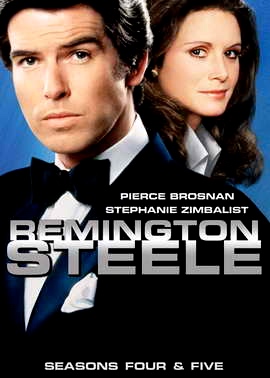
Victor sees Pierce Brosnan and Remington Steele as idols – he himself would like to go to America and become known there.
As Victor describes his growing up years and his life seems to become more normal, it is his overwhelming love for Rachel which helps to create his transformation. They love watching the TV series of Remington Steele: “We were kind of proud of Pierce [Brosnan], an Irishman holding his own in the middle of all that Americanness. That was where we were headed, I thought. America, or at least a bigger place.” As Rachel’s career takes off as a celebrity chef and radio personality, they decide to move into an apartment which they will build above Dublin’s Temple Bar, where Rachel has her kitchen, a place quite different from what it is now, with real people, a local population, and working class values, including “puking and shouting.” Victor becomes convinced, as he comes to know some of the people working on Rachel’s show, that “I had a book in me,” and he realizes, too, that “I’d fallen in love with an adult. I wasn’t a fraud; I was a slow starter.”
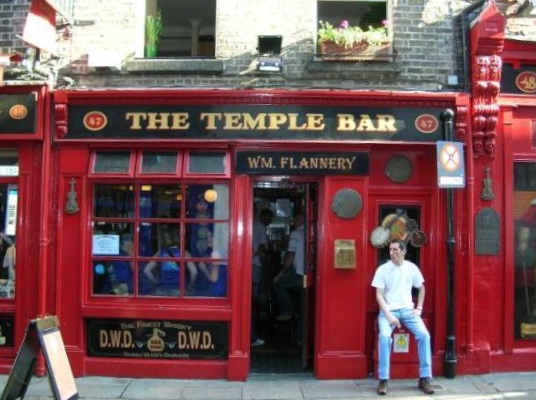
An early photo of the Temple Bar, from about the time of Victor and Rachel. Their apartment would have been on an upper floor above the bar.
The novel to this point feels like a well designed and well developed novel of character, especially the Irish character, and I would advise anyone who likes the sound of the book to this point and has plans to read it to avoid reading professional criticism of this book. A major surprise occurs at the conclusion, and it was spoiled for me by a professional critic who revealed the surprise in a review published by a major review venue. While I hold the critic and the journal’s publisher responsible for that sad eventuality, some of the fault may be Doyle’s. The surprise at the end comes abruptly – and even awkwardly – with no obvious preparation for the reader – and while others may be able to accept it wholeheartedly, there is an aura of trickery – for me at least – as the author resolves all the aspects of the novel very suddenly. This is not to say that the tour de force ending comes completely out of the blue, but it appears at a point at which the reader has already lived through many traumas with Victor, who is coming to some recognitions of his own. Ultimately, the ending feels contrived and artificial, and I think Doyle’s long-time fans deserved better.
ALSO by Doyle, reviewed here: THE DEAD REPUBLIC, THE GUTS, A STAR CALLED HENRY, LOVE, LIFE WITHOUT CHILDREN
Photos: The author’s photo is appears on https://www.independent.ie/
The 1968 poster of the Night of the Living Dead is from https://unfspinnaker.com/
The Remington Steele poster may be found on http://img.moviepostershop.com/
An early photo of the Temple Bar, from about the time of Victor and Rachel, appears on https://www.tripadvisor.co.uk
